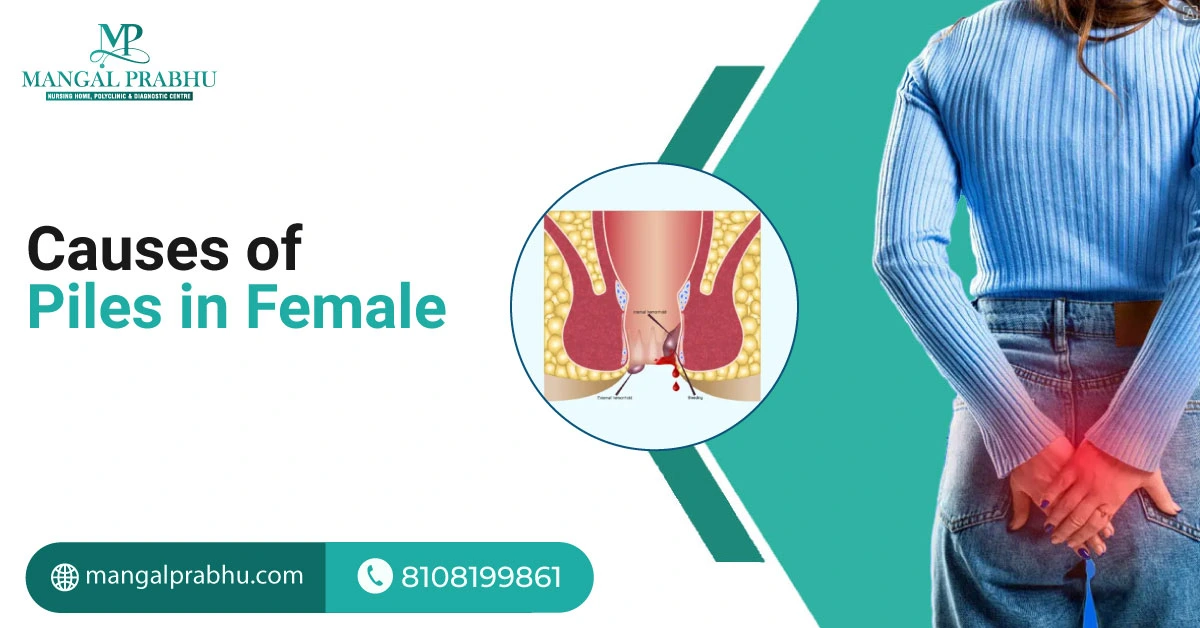
Causes of Piles in Female
Hemorrhoids, also called piles, occur when the veins in your anus or the lower rectum enlarge and become swollen. Piles are painful and can cause itching and sometimes bleeding. A piles specialist doctor in Navi Mumbai will recommend medication, minimally-invasive procedures, and sometimes surgery to ease your symptoms.
In this post, we’ll take a look at the common causes of piles in women.
Common Causes of Piles in Females
a) Pregnancy and Childbirth
Many factors can lead to piles in females during pregnancy and childbirth. For starters, hormonal fluctuations cause your vein walls to relax, which may heighten the risk of piles.
Additionally, as the mother approaches the third trimester, the growing uterus puts pressure on the pelvic region, enlarging the veins. This combined with the slower blood flow to the rectal area can result in the formation of piles during pregnancy. Women may also develop piles during childbirth, as the act of straining can trigger them.
b) Hormonal Changes
A woman undergoes significant hormonal changes during menstrual cycles, pregnancy, and menopause. These hormonal shifts can affect your dietary changes, which might lead to constipation, triggering hemorrhoids.
c) Dietary Factors
If your diet doesn’t contain sufficient amounts of fiber or is mainly composed of processed foods, you might experience hard stools. Excessive strain on the rectal veins can make you more likely to develop piles.
Lifestyle Factors Contributing to Piles
i) Sedentary Lifestyle:
If your job involves prolonged sitting or you live an inactive lifestyle, you might be more prone to developing piles than others. That happens because of reduced blood flow to the rectal area, leading to enlarged veins.
ii) Obesity:
Overweight people or those falling into the obese category are also at an increased risk of piles. The more you weigh, the higher the pressure on the pelvic region. This affects blood circulation, which may eventually result in piles.
Preventative Measures
Visit a hospital for piles treatment in Navi Mumbai to determine the most appropriate treatment plan for your case. Piles in women that occur due to temporary hormonal shifts, such as during pregnancy and childbirth, are likely to resolve on their own. Still, you must take certain preventative measures to reduce your likelihood of getting piles.
1) Dietary Adjustments:
The single most common reason for piles is excess pressure on the anal canal, which occurs when you strain excessively and frequently. To avoid that, eat a diet rich in fiber. Whole grains, green leafy vegetables, and fruits are the best examples.
2) Regular Physical Activity:
Exercise helps prevent hemorrhoids by improving blood flow to the rectal area, strengthening pelvic floor muscles, and keeping weight in check. It controls most factors that might contribute to a heightened risk of piles in females.
3) Drink Enough Water:
Aim to drink 8-10 glasses of water a day to keep the stool consistency soft. Hydration makes stool easily passable, reducing the risk of constipation and piles.
Conclusion
Although both men and women can develop piles, hormonal changes (particularly during pregnancy) make women more prone to developing them. Understanding the causes of piles in females can help you take preventative measures and reduce the risk.
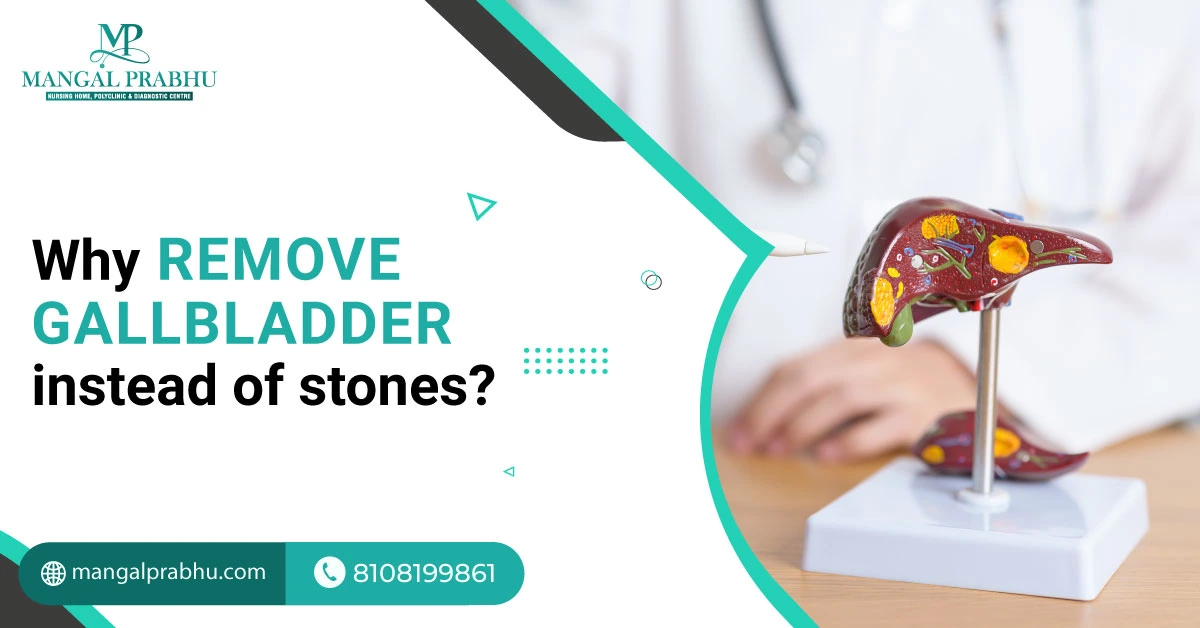
Why Remove Gallbladder Instead of Stones?
Excess cholesterol and bilirubin in the bile can result in hard deposits or gallstones, which form inside the gallbladder. Although a general surgeon in Navi Mumbai may recommend treatment to dissolve these stones or remove them, leaving the gallbladder intact, it’s often advised to have the entire gallbladder removed. To know why removing the gallbladder is a good move, let’s first understand what gallstones are and their symptoms.
Understanding Gallstones
The gallbladder is a pear-shaped organ that stores bile, a digestive fluid that aids in breaking down fatty foods. Occasionally, bile can harden, resulting in stone-like formations. These hardened deposits can vary in size and quantity. Here’s what individuals with gallbladder stones are likely to experience:
- Nausea and vomiting
- Bloating
- Pain in the upper right abdomen
- Back pain
- Jaundice
- Fever and chills
Some people do not experience any symptoms, while others report severe abdominal pain with fever, requiring immediate medical attention.
Treatment Options for Gallstones
If your gallstones are asymptomatic, you may not need treatment. However, if you experience the above symptoms, your doctor will discuss the below-listed invasive and non-invasive treatment options.
1) Non-surgical Treatments:
Medication to dissolve gallstones can help, but it is usually reserved for patients who are unable to undergo surgery. The medication may take months or years to dissolve the stones, and even if they are dissolved, there’s no guarantee that the stones won’t recur. Shock wave lithotripsy is another non-surgical way to remove gallstones with sound waves, but it is also rarely performed.
2) Lifestyle Changes:
Switching to a healthy lifestyle with low-fat diets and exercise can help prevent new stone formation but won’t remove the existing gallbladder stones.
3) Cholecystectomy:
A surgical removal of the gallbladder offers a permanent cure for recurring gallbladder stones. A minimally-invasive Cholecystectomy involves a laparoscopic removal of the gallbladder, thus a shorter recovery and fewer complications.
Why Remove the Gallbladder Instead of Just the Stones?
Cholecystectomy is a more preferred treatment for gallstones than removing just the gallstones or dissolving them with medication. Gallstones form because of an underlying issue with the gallbladder function. While you may remove the stones, the root cause that led to the stone formation in the first place won’t be fixed.
With cholecystectomy, you can have peace of mind knowing that the stones won’t recur, eliminating your risk of developing complications like jaundice, pancreatitis, cholecystitis, and biliary obstruction. Besides that, you can live a healthy and normal life without a gallbadder. Instead of being stored in the gallbladder, the bile will flow from the liver to the small intestine. You won’t experience any significant digestion change after the surgery.
Benefits of Gallbladder Removal
Here’s why the gallbladder removal surgery in Navi Mumbai an ideal choice for patients with gallstones:
- No chance of gallstone recurrence
- Prevents blockages, pancreatitis, and other gallstone-related complications
- Faster recovery
Cholecystectomy is an effective and safe treatment option for gallstone removal. The surgery offers long-term relief from the gallstone symptoms and prevents life-threatening complications. Since it doesn’t impact your digestive function, it’s the most preferred solution to gallbladder stones.
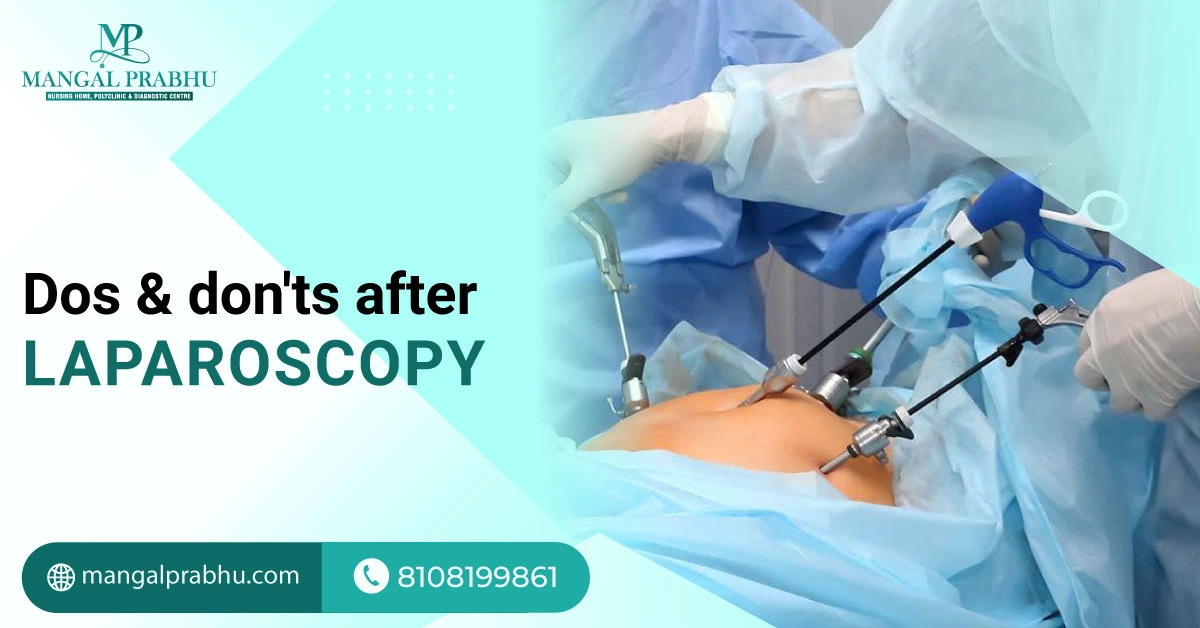
Dos and Don’ts After Laparoscopy
Laparoscopic surgery is a minimally invasive procedure that helps your general surgeon in Navi Mumbai take a deeper look at your internal organs, get the most accurate diagnosis, and figure out a viable treatment plan.
Laparoscopy can be used for diagnosis and treatment. For instance, it can give your surgeon a clear picture of the uterine fibroids while also removing them through several small incisions on your abdomen. The question is, what does recovery look like, and what can you do after laparoscopy to speed up your recovery? Let’s take a look at the several dos and don’ts after laparoscopy.
Dos and Don’ts After Laparoscopy
Dos After Laparoscopy
i) Follow Your Doctor’s Instructions:
Your surgeon will explain post-operative instructions, such as when to wash the incision site, when to start walking, how much physical activity is safe, the medication you should take, and when to see your doctor. Follow their instructions carefully.
ii) Maintain a Balanced Diet:
Eat a diet rich in essential vitamins, minerals, fiber, omega-3 fatty acids, and other nutrients to maintain your energy levels. If you experience stomach ache or gas, switch to bland, low-fat food. Drink enough fluids to maintain hydration.
iii) Engage in Light Physical Activity:
Rest is the key to fast recovery, but that doesn’t mean you need to go into bed rest. Light activity, such as a stroll in your street or gentle stretching a few days after the surgery, can help promote blood circulation, prevent blood clots, and speed up your recovery.
iv) See Your Doctor:
Visit the surgery hospital in Navi Mumbai for your follow-up appointments. Your surgeon will assess your incision and your overall health to ensure you are in good health and recovering normally.
Don’ts After Laparoscopy
a) Avoid Heavy Lifting:
Do not push yourself beyond your limits. While it’s normal to want a quick recovery and to want to get back to your routine life soon after surgery, strenuous exercises must be avoided. Likewise, heavy lifting, including carrying grocery bags, suitcases, pets, and babies, is off-limits.
b) Refrain From Driving Immediately:
Arrange your drive back home after surgery. Driving is usually restricted until you are on pain meds. Besides, sitting for prolonged hours can strain your abdomen.
c) Don’t Neglect Signs of Complications:
See your doctor immediately if you have a high-grade fever that persists for days with swelling and discharge from the incision site. Other signs of complications include severe pain that doesn’t subside with pain-relieving medication, nausea, vomiting, and difficulty breathing.
Tips for a Smooth Recovery
Here’s what you can do to achieve fast recovery:
- Practice light physical activity
- Use a pillow for abdominal support when laughing, sneezing, or coughing
- Avoid household chores until your doctor clears you for it.
- Watch out for unusual signs and seek immediate medical assistance
- Get ample rest
Conclusion
While there’s a general recovery timeline for laparoscopy, every patient has their own recovery journey. Your progress after the procedure depends on the hospital, the doctor’s expertise, the nursing staff, your pain tolerance, the duration of the surgery, and other factors.
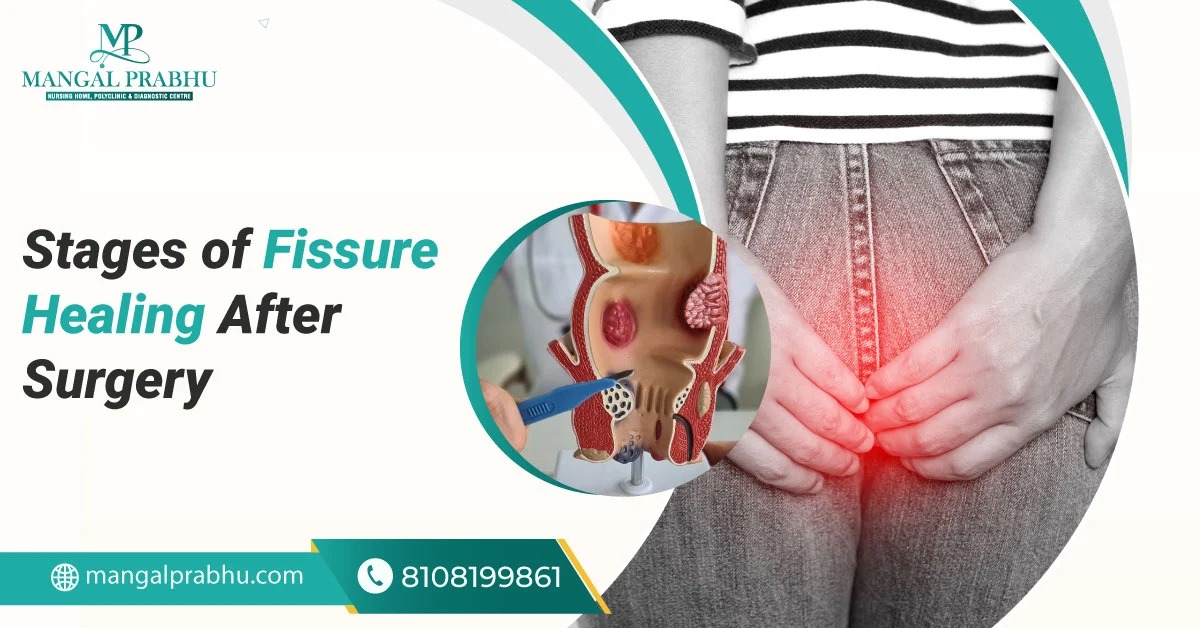
Stages of Fissure Healing After Surgery
Anal fissures are painful sores and cracks in the lining of the anus. They are common in people who experience constipation and pass large and hard stools. Anal fissures can heal on their own with natural home-based remedies, but if the symptoms don’t seem to improve within 2-4 weeks, it’s advisable to see a fissure surgeon in Navi Mumbai.
Surgical intervention might be required in some cases. If you’ve undergone surgery, it should take a week or two to recover and get back to your routine. Here are the signs you are healing well after anal fissure surgery.
Immediate Post-Surgery Phase (0-2 weeks)
i) Reduced Pain and Discomfort
Anal fissures cause extreme pain, which is like a throbbing sensation or spasms. Some people describe the pain as if the razor blade is passed through the anus. The pain is often felt after passing a stool and can last from a few minutes to an hour or longer.
The most common sign you are healing from an anal fissure surgery is the reduced pain. Some pain and discomfort, especially during and after a bowel movement, is normal, but it should start subsiding gradually.
ii) Wound Care
Your doctor might recommend laxatives to soften the stool. Wash the area with warm water using a handheld shower after passing a stool for the first few weeks. Avoid soaps and other topicals that might irritate the anus.
Early Healing Phase (2-6 weeks)
The swelling and pain will reduce drastically, making sitting and other physical activities more comfortable. If you notice increased pain, swelling, redness, and discomfort, consult your doctor immediately.
The incision site might still be red and a little tender, but inflammation should reduce, and so should any discharge. Bowel movements will be much easier.
Sitz baths can help reduce swelling and pain. To speed up healing, do them 2-3 times a day or as advised by your doctor.
Intermediate Healing Phase (6-12 weeks)
Any lingering pain should resolve within 6-12 weeks. If you had discomfort while passing a bowel movement in the initial weeks, this should go away completely. The tissue will heal by this time. Swelling will either completely disappear or get mild.
Have a fiber-rich diet to promote faster healing and ensure minimal discomfort and tissue damage during a bowel movement. Eating well and staying hydrated will ensure soft stools and a lesser risk of constipation.
Late Healing Phase (3-6 months)
Anal fissure surgery treatment in Navi Mumbai takes 3-6 months for complete recovery. You should feel normal and have no discomfort or pain on the site of the incision. You should have regular bowel movements with no fissure-related discomfort.
Regular check-ups are crucial to ensure proper healing after surgery. The surgeon will check if the area is healing well and whether there’s a sign of a fissure recurrence.
Following a healthy diet plan and keeping the area clean will speed up your healing. Stay in touch with your surgeon to see if the area is healing well. Report any unusual symptoms, such as high fever, excessive swelling, increased redness, and extreme pain, to your doctor.
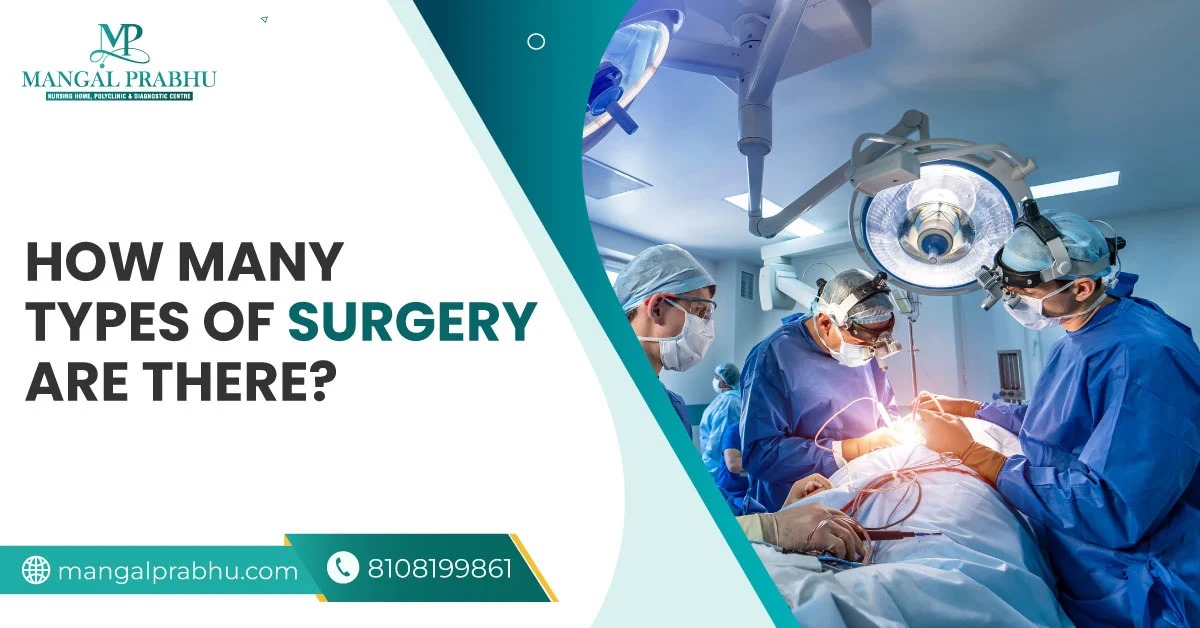
How Many Types of Surgery Are There?
A surgical procedure is an invasive medical treatment recommended for patients who have sustained an injury or are diagnosed with a serious medical issue. The term “surgery” can sound daunting, but the advancement in technology and modern techniques to execute surgical procedures have made it pretty common. In fact, a vast majority of surgeries performed at surgery hospitals in Navi Mumbai involve specialized equipment, like a laparoscope or a robotic arm, for increased precision and faster recovery. Let’s explore different types of surgeries.
Common Types of Surgery
a) General Surgery:
A general surgeon in Navi Mumbai specializes in various surgical procedures that involve your abdominal cavity. It mainly includes surgery of your liver, appendix, spleen, small and large intestine, endocrine system, breasts, and more.
b) Orthopedic Surgery:
This area of medical science treats musculoskeletal conditions, such as rheumatoid arthritis, osteoporosis, sports injuries, and other benign or malignant bone diseases.
c) Neurosurgery:
A neurosurgeon specializes in brain, spinal cord, and other surgical procedures related to your nervous system.
d) Cardiovascular Surgery:
Cardiovascular surgery covers all heart-related surgeries, including bypass procedures, angioplasty, and lung surgery.
e) Plastic Surgery:
This area of medicine involves cosmetic and reconstructive surgery, such as facelifts, breast augmentation, nose reshaping, liposuction, and tummy tuck.
Specialized Types of Surgery
i) Laparoscopic Surgery:
Laparoscopic surgery is a minimally invasive procedure that involves small incisions made on the abdomen or the affected area. It can be performed for a diagnostic purpose or to treat a specific medical condition. Hysterectomy is commonly performed with a laparoscope.
ii) Robotic Surgery:
Robot-assisted surgeries have gained immense popularity lately. They’re mostly preferred for joint replacement surgeries. A surgeon uses a robotic arm to make precise cuts and ensure accurate prosthesis implantation.
iii) Transplant Surgery:
When your vital organs malfunction or stop functioning altogether, a transplant surgery might be needed to restore your normal body function. In this procedure, a healthy organ from the donor’s body is removed and implanted into the recipient’s body. Sometimes, the surgeon removes the healthy parts of your body and implants them into your damaged parts.
iv) Bariatric Surgery:
It is for patients who can’t lose weight despite diet modifications and weight loss plans. The surgery decreases hunger hormones and cuts a major portion of the stomach.
Emerging Types of Surgery
A) Regenerative Surgery:
This concept involves regenerating damaged tissues and organs in the body through gene therapy, stem cell therapy, and tissue engineering.
B) Gene Therapy Surgery:
Gene therapy is an advanced medical procedure that fixes defective genes by removing or altering the DNA in a human’s gene. The treatment is effective for several gene-related disorders.
C) Nanosurgery:
Nanosurgery is a highly specialized yet minimally invasive medical procedure that focuses on repairing cells without damaging the surrounding organs and tissues. The surgery is performed with devices working at the nanoscale.
Conclusion
Modern science has made surgery less complicated. There’s a low risk of excessive blood loss or surgery-related complications, such as infection and blood clots. Antibiotics, sutures, and anti-inflammatory medication are quite effective in improving the success rates of surgery, making it suitable for most patients.
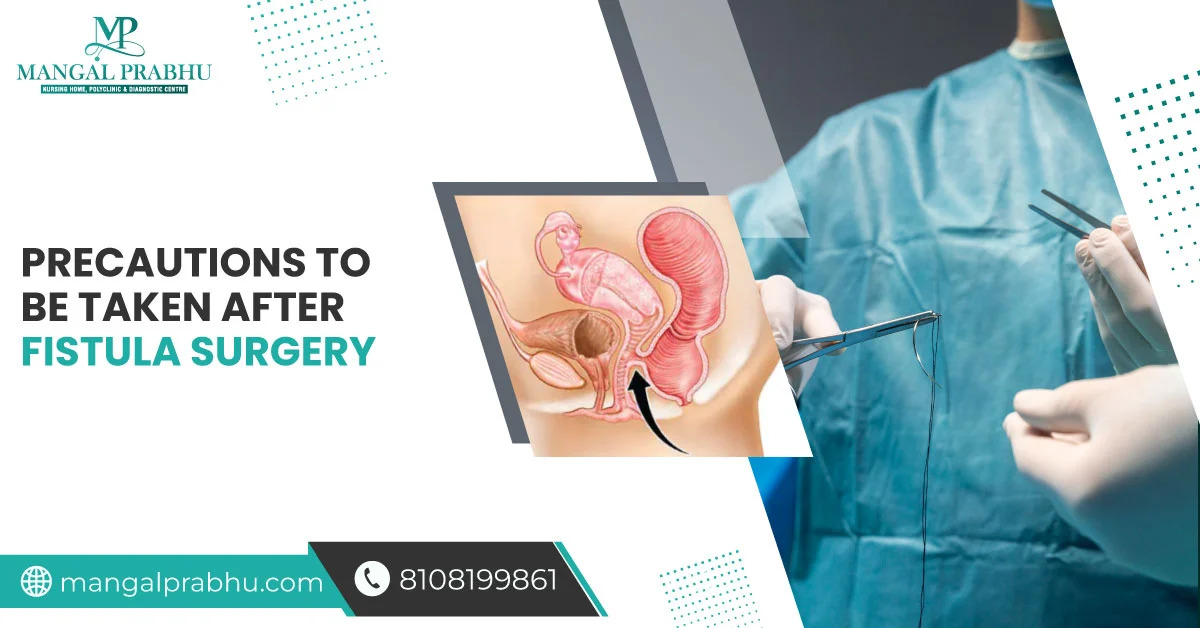
Precautions to Be Taken After Fistula Surgery
What is Fistula Surgery?
Surgery of fistula means that it is the treatment of diseases leading to the formation of pathways like fistulas. But there are some activities that need to be done by the patients who have undergone this surgery for them to gain their normal health back.
This article will focus on measures that should be taken by a patient who has undergone fistula surgery, being at home, proper rest, the activities that should be undertaken or avoided and next appointment with the surgeon.
Precautions to Be Taken After Fistula Surgery
a) How to Take Care
Do not cover the surgical area with clothing or bandages immediately after coming home and avoid washing the area for at least 48 hours. It is also important to change dressings or bandages where necessary as advised by the fistula treatment in Navi Mumbai. Ensuring one takes all medications properly and on time will help prevent the occurrence of an infection and facilitate faster recovery.
b) Physical Activity and Rest
Rest is critical after fistula surgery. Do not do any strenuous tasks for 4-6 weeks. Walking indoors is okay after a few days but avoid physical exertion. Get plenty of sleep and rest as advised by the surgeon to allow the healing process.
c) Wound Care
Check the wound daily for signs of infection like increased pain, redness or pus. Clean gently with antiseptic and apply any ointment as recommended. Avoid submerging the wound in water for 2-3 weeks. Contact the fistula surgeon in Navi Mumbai if you notice infection.
d) Bowel Habits
It is common to experience irregularity after surgery due to medications. Increase fibre and water intake. Warm fluids and walking may help. Gentle exercise like swimming can resume 4-6 weeks post-op. Contact the fistula treatment in Navi Mumbai doctor if no bowel movement for more than 3 days.
e) Follow-Up Appointments
Follow up with the fistula surgeon in Navi Mumbai as directed, usually after 1, 4 and 12 weeks. This is to check healing and provide further advice. Discuss any concerns at follow-ups for timely management. Early identification of issues allows problems to be addressed correctly.
f) Returning to Normal Activities
It takes 4-6 weeks to fully recover. Resume light chores at 3 weeks, driving at 4-5 weeks. Return to work when comfortable, usually 4-6 weeks depending on the job. Exercise and physical activity levels can be gradually increased over weeks under guidance of the fistula surgeon in Navi Mumbai.
g) Prevention of Recurrence
It is essential more often for all post-op measures and recommendations given by the fistula surgeon in Navi Mumbai to avoid formation of fistula again. Discourage poor bowel movements and unsanitary practices such as not washing for a long time. Inform your doctor about any symptoms of infection or non-healing as early management prevents recurrence.
Conclusion
Taking the recommended precautions after fistula surgery is key to healing properly and avoiding complications. Rest, medication, wound care, diet and lifestyle changes are important as per guidance of the treating fistula surgeon in Navi Mumbai. Following all advice and attending scheduled follow-ups helps ensure full recovery. For any concerns, one must contact the fistula treatment centre in Navi Mumbai without delay.
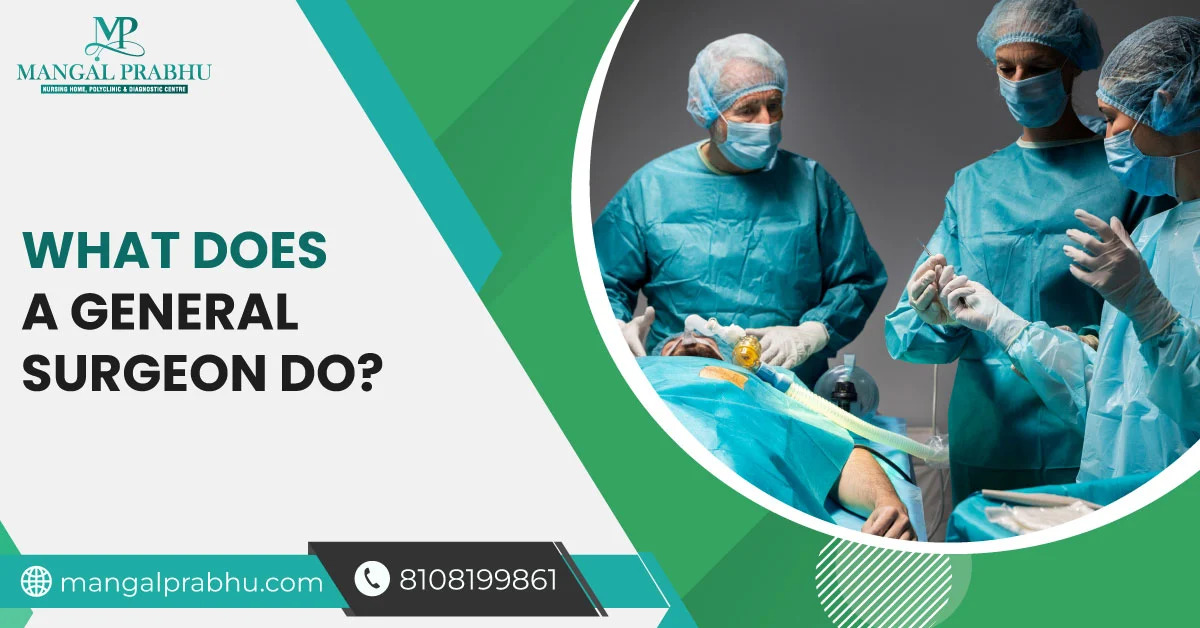
What Does a General Surgeon Do?
A general surgeon is a certified and licensed healthcare specialist who performs a wide range of surgical procedures. They are different from surgeons specializing in certain fields, like cardiologists (heart specialists), neurologists (brain surgeons), and oncologists (surgeons of cancer). These surgeons perform operations on the abdomen, gastrointestinal tract, musculoskeletal system, and other general body parts. So, when exactly do you need to see a general surgeon in Navi Mumbai, and what’s their role? Let’s find out.
The Role of a General Surgeon
A general surgeon is a specialist in many physical conditions that may or may not require surgical intervention. If they believe the condition is too complicated to be treated, they will refer you to a specialist for the particular disease. Here’s what they do:
a) Surgical Procedures Performed
An experienced surgeon can perform surgical procedures for a medical condition or a cosmetic purpose. They might choose open surgery or perform a laparoscopic procedure, which involves small instruments that give a clear picture of your internal organs. In addition, some general surgeons have embraced robot-assisted surgical procedures to ensure maximum precision and the best outcome with minimal risk of post-surgical complications.
b) Pre and Post-Operative Care
Post-operative care involves the follow-up treatment after a surgical procedure. The level of post-op care a patient needs depends on the type of surgery and their health status. A general surgeon will give detailed instructions regarding what to eat, avoid, and how to take care of the wound. They will also ask you to schedule follow-up appointments for post-operative care.
c) Patient Education and Counseling
You might see a general surgeon for a chronic disease, a severe illness, or a sudden accident. Based on your symptoms and health, they will recommend the most suitable medical treatment. Patient counseling is part of their job. They discuss the available treatment options and determine the most reliable plan that fits your condition.
Common Surgical Procedures Performed by General Surgeons
A general surgeon can perform a vast array of surgical procedures, including:
i) Appendectomy:
A surgery to remove an inflamed appendix. It’s an emergency medical condition that requires immediate removal of the appendix to save the patient’s life. The surgeon can perform it laparoscopically or choose an open surgery.
ii) Breast Surgery:
A general surgeon specializes in breast augmentation, reconstruction, reduction, removal, and lumpectomy. Breast surgery can be a part of a cancer treatment or a cosmetic procedure.
iii) Colorectal Surgery:
Colorectal surgery involves the treatment of your large intestine, i.e., rectum, anus, and colon. A general surgeon might perform a colorectal surgery if you are diagnosed with cancer of the colon and other parts of your large intestine, have polyps, or have inflammatory bowel disease.
iv) Hernia Repair:
A surgery hospital in Navi Mumbai has a general surgeon who can treat nearly all types of hernia. The surgery helps push the bulging hernia back into its original place and involves placing a mesh material that strengthens the weakened tissues.
From removing small skin lesions to performing surgery on the internal organs, a general surgeon does it all.
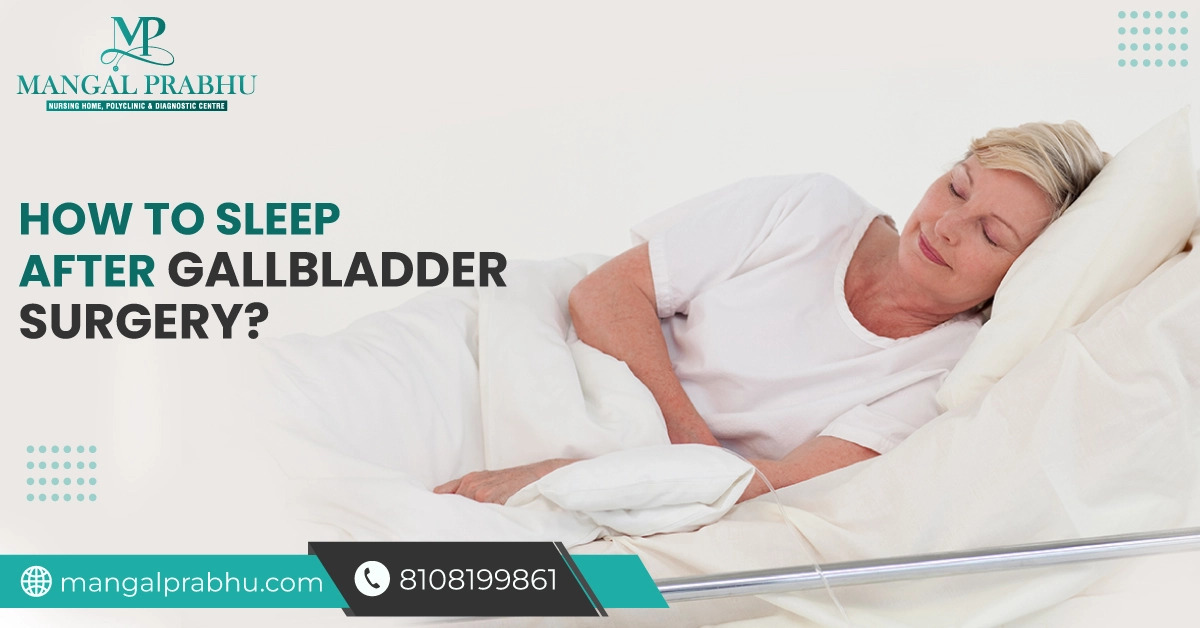
How to Sleep After Gallbladder Surgery?
Introduction
Gallbladder surgery can deliver relief from aches and soreness, whether it’s miles removal or other techniques. It is a necessary step towards stepped-forward fitness and health. However, the street to recovery has its problems with sleep; therefore, we’ll display you a few strategies that may assist in restful sleep after gallbladder surgical treatment. Visit Mangal Prabhu Hospital If you continue to face problems.
Understanding Gallbladder Surgery
A Gallbladder surgical operation is finished to find out issues like gallstones or other infections like inflammation that affect the organ. Though the surgical procedure aims to improve fitness and decrease signs, there nevertheless can be post-surgical treatment effects that can deliver aches, discomfort and modifications in digestion, all of which can disrupt sleep.
Post-Surgery Recovery and Sleep
The night after surgical operation can be a hard one for sleep as pain and soreness from the surgical areas and the aspect outcomes of medicinal drugs can make it hard to locate a snug sleeping position. Furthermore, it modifies the digestion and dietary regulations that could cause discomfort all through the night. Gallbladder Disease Treatment in Navi Mumbai offers an amazing remedy that can help in lowering the aftereffects of gallbladder surgical procedures.
Also Read: Signs Of Complications After Gallbladder Surgery
Tips for Better Sleep After Gallbladder Surgery
1. Establishing a Comfortable Sleep Environment
A sleep friendly environment is essential to sleep peacefully. Make sure your bedroom is cool, quiet and dark with a comfy pillow and bed. Think about the use of more pillows to lessen stress on the surgical website and help your frame.
2. Following Restful Sleep Hygiene Practices
Make limitations on the intake of caffeine and alcohol intake and decrease display screen time earlier than sleep. Good sleep hygiene is essential for restful sleep at some point in the recovery duration. Establish a regular agenda for the regular mattress and wake times throughout the recovery.
3. Incorporating Relaxation Techniques Before Bed
Relaxation strategies like deep respiration, mild stretching, or meditation can assist in calming the mind and frame earlier than bedtime. Gallbladder Surgeon in Navi Mumbai enables patients in each aspect. They ensure that the patient is having as few issues after surgery as possible. Take attention to setting up a recurring bedtime that includes these practices in an effort to help your body to help in sleep by way of signaling the frame that it’s time to unwind.
Conclusion
Recovering from gallbladder surgery is indeed a time-consuming procedure; endurance,self-care, and, now and again, extra attention to sleep aren’t clean for the patient who simply went through the surgery. Establishing precise sleep hygiene practices, snug sleep surroundings, and the usage of rest techniques earlier than the mattress can enhance the body’s recovery process and improve the overall sleep amount. It is essential to be gentle with yourself at some point this time and reach out to professional healthcare companies like Mangal Prabhu Hospital that assist in offering the best hospitality to the patient. Having proper care and hints to improve overall napping can make your post-surgical operation sleeping troubles.
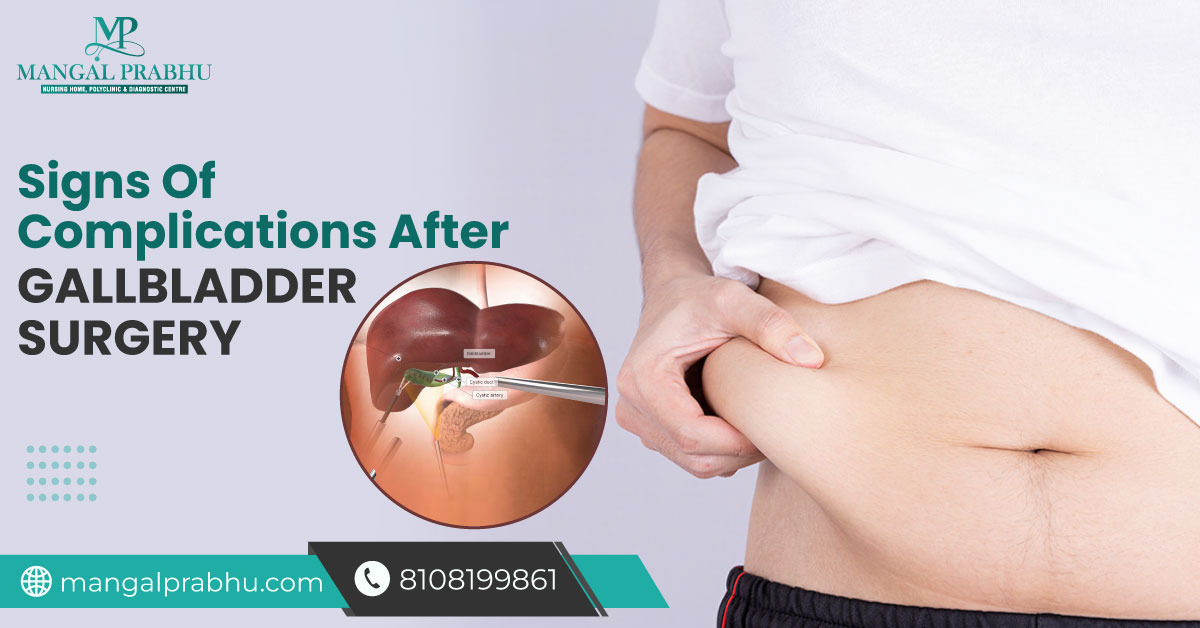
Signs Of Complications After Gallbladder Surgery
The best gallbladder surgeon in Navi Mumbai at Mangal Prabhu Hospital removes gallbladder from the body which helps in eliminating the pain associated with gallstones. Besides relieving the pain of gallstones, it also helps in reducing various issues. However, life without a gallbladder does not change much but sometimes it would be best for an individual to learn the signs of complications associated with this treatment.
As every surgical procedure has some risk, Gallbladder surgery may also lead to some common and severe complications. Thus, recognizing the signs of complications after this surgery is essential and helps in ensuring a smooth recovery and reducing unforeseen medical issues. Therefore, this guide provides a quick insight into common complications associated with post-gallbladder surgery.
Common complications after gallbladder surgery
Some common complications that individuals may encounter post-gallbladder surgery may include:
1) Infection
Postoperative convalescence can resemble a controlled construction site, yet the potential for infections persists. Indicators such as erythema, edema, and discomfort around the surgical site serve as sentinel manifestations of an unwarranted microbial intrusion demanding prompt attention.
2) Bile duct injury
Analogous to a backstage malfunction, inadvertent bile duct injury during surgery can result in symptoms of bile leakage, abdominal pain, and jaundice, signaling a deviation from the anticipated convalescence trajectory.
3) Bleeding
Though a certain degree of drama is inherent in any surgical procedure, excessive bleeding merits heightened attention. Increased pain, unexpected bruising, or feelings of weakness act as signals, warranting investigation into potential complications.
4) Bowel injury
The adjacent bowels, susceptible to sensitivity, may experience disruption during surgery, leading to abdominal discomfort and triggering internal alarms in rare instances.
Also Read: A Comprehensive Guide To Gallbladder Stone Removal
Signs of complications after gallbladder surgery
i) Fever and chills
An individual may experience increased body temperature, chills, and fever which may show signs of infection.
ii) Severe abdominal pain
Some people may experience intense and persistent abdominal pain which may indicate complications with bile duct injury or internal bleeding.
iii) Jaundice
The emergence of a yellowish tint in the skin and eyes suggests a noteworthy development. Jaundice indicates potential complications and mandates prompt medical attention.
iv) Persistent nausea and vomiting
While postoperative digestive adjustments are expected, persistent nausea and vomiting suggest lingering complications, potentially in the form of infection or bile leakage.
When to seek medical attention
a) Immediate medical attention
If you find yourself entangled in the dissonance of chest pain, abdominal discomfort, or the breathless whispers of difficulty breathing, don’t hesitate—rush to the virtuosos at Mangal Prabhu Hospital for unparalleled gall bladder stones treatment in Navi Mumbai. Swift, emergency medical care isn’t just an option; it’s the overture to safeguarding your well-being and sidestepping potential risks.
b) Contacting the surgeon
If you find a hint of jaundice, fever, or unwelcome abdominal discomfort, then reach out to your surgeon. By consulting with your surgeon promptly, you can take immediate action, ensuring that any nuances in your recovery are met with expert precision.
Conclusion
As you navigate the post-gallbladder surgery landscape, being attuned to the signals your body sends is like having a backstage pass to your recovery. With a keen eye for signs of complications and prompt response, you can ensure better medical attention for a successful postoperative journey.
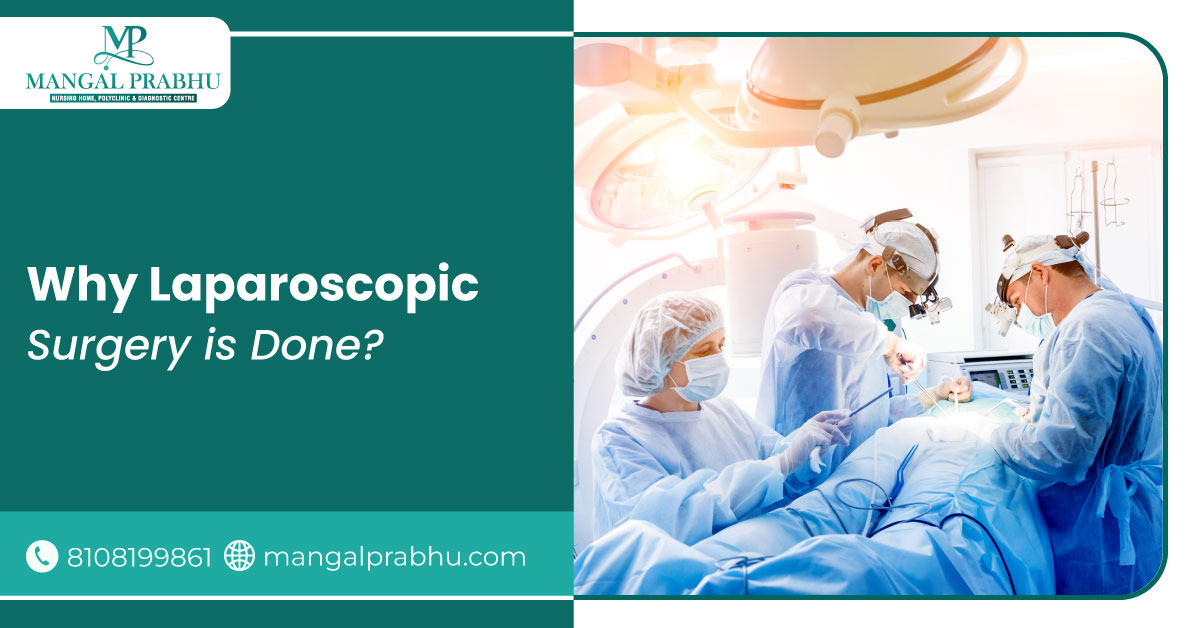
Why is Laparoscopic Surgery Done?
This minimally invasive surgery has emerged as a transformative approach in the realm of medical interventions. This innovative technique involves making small incisions through which a laparoscope, a tiny camera, is inserted to visualize and treat various conditions within the abdominal cavity. Mangal Prabhu Hospital is at the forefront of this groundbreaking practice, known for its excellence and a team of proficient Laparoscopic Surgeons in Navi Mumbai.
Reasons for Laparoscopic Surgery
i) Diagnosing Abdominal Pain
Laparoscopic surgery is often employed to identify the cause of unexplained abdominal pain. The laparoscope allows surgeons to explore the abdominal organs and tissues, facilitating a precise diagnosis.
ii) Removal of Cysts and Tumors
The minimally invasive nature of laparoscopic surgery makes it an ideal choice for removing cysts and tumors from various organs, including the ovaries and uterus. This approach minimizes trauma, accelerates recovery, and reduces scarring.
iii) Diagnosing and Treating Infertility
Laparoscopic surgery plays a crucial role in diagnosing and treating infertility issues. It enables the visualization of the reproductive organs, helping identify conditions such as endometriosis or blocked fallopian tubes that may contribute to infertility.
Preparation for Laparoscopic Surgery
Before undergoing Laparoscopic Surgery in Navi Mumbai, certain preparatory steps are essential to ensure a smooth and successful procedure.
a) Blood Tests
Comprehensive blood tests are conducted to assess the patient’s overall health, identify any underlying conditions, and ensure they are fit for surgery.
b) Imaging Tests
Various imaging tests, such as ultrasound or CT scans, may be performed to provide a detailed view of the abdominal area and aid in surgical planning.
c) Medications
Depending on the patient’s medical history and the nature of the surgery, medications may be prescribed to optimize the surgical process and enhance postoperative recovery.
Procedure of Laparoscopic Surgery
A) Anesthesia
Laparoscopic surgery is typically performed under general anesthesia to ensure the patient remains unconscious and pain-free throughout the procedure.
B) Insertion of the Laparoscope
Small incisions, usually less than an inch long, are made near the surgical site. The laparoscope is inserted through one of these incisions, providing a high-definition view of the internal organs on a monitor.
C) Making the Incision
Additional small incisions may be made to accommodate specialized instruments needed for the surgery. The surgeon carefully guides these instruments to perform the required procedures.
Recovery and Aftercare
1) Diet and Lifestyle Modifications
Following laparoscopic surgery, patients are advised on specific diet and lifestyle modifications to support healing. These recommendations may include dietary restrictions, activity levels, and postoperative care measures.
2) Follow-up Visits
Regular follow-up visits with the laparoscopic surgeon are crucial to monitor recovery, address any concerns, and ensure the patient’s overall well-being.
Conclusion
Laparoscopic surgery has revolutionized the landscape of surgical interventions, offering patients the benefits of reduced pain, quicker recovery, and minimized scarring. At Mangal Prabhu Hospital, a leading center for laparoscopic surgery in Navi Mumbai, the expertise of skilled surgeons combined with state-of-the-art facilities ensures that patients receive optimal care and the best possible outcomes. Choosing laparoscopic surgery at this hospital is not just a medical decision; it’s a commitment to personalized and advanced healthcare.
